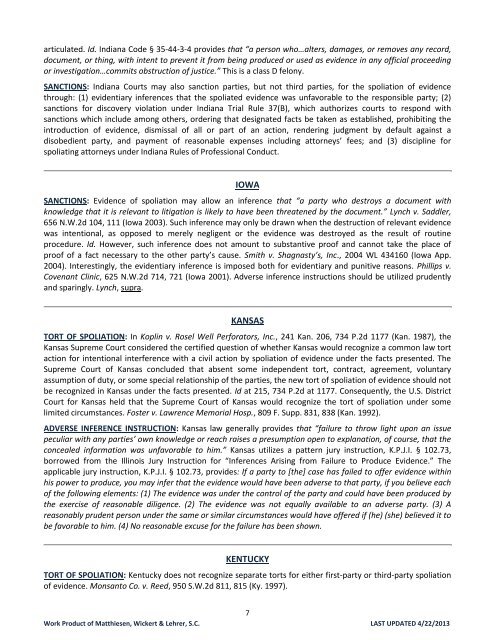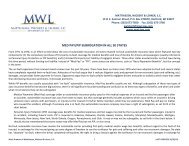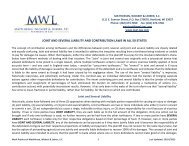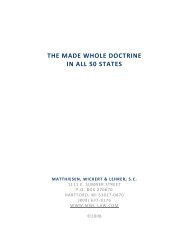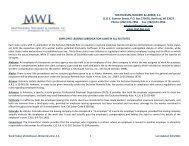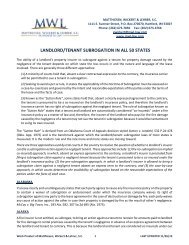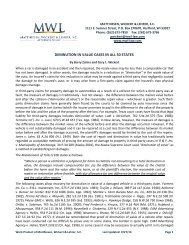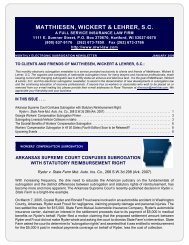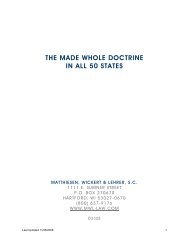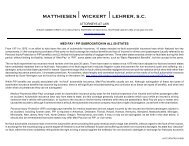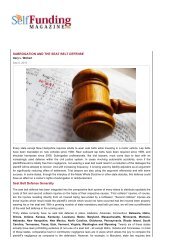spoliation of evidence in all 50 states - Matthiesen, Wickert & Lehrer
spoliation of evidence in all 50 states - Matthiesen, Wickert & Lehrer
spoliation of evidence in all 50 states - Matthiesen, Wickert & Lehrer
Create successful ePaper yourself
Turn your PDF publications into a flip-book with our unique Google optimized e-Paper software.
articulated. Id. Indiana Code § 35-44-3-4 provides that “a person who…alters, damages, or removes any record,document, or th<strong>in</strong>g, with <strong>in</strong>tent to prevent it from be<strong>in</strong>g produced or used as <strong>evidence</strong> <strong>in</strong> any <strong>of</strong>ficial proceed<strong>in</strong>gor <strong>in</strong>vestigation…commits obstruction <strong>of</strong> justice.” This is a class D felony.SANCTIONS: Indiana Courts may also sanction parties, but not third parties, for the <strong>spoliation</strong> <strong>of</strong> <strong>evidence</strong>through: (1) evidentiary <strong>in</strong>ferences that the spoliated <strong>evidence</strong> was unfavorable to the responsible party; (2)sanctions for discovery violation under Indiana Trial Rule 37(B), which authorizes courts to respond withsanctions which <strong>in</strong>clude among others, order<strong>in</strong>g that designated facts be taken as established, prohibit<strong>in</strong>g the<strong>in</strong>troduction <strong>of</strong> <strong>evidence</strong>, dismissal <strong>of</strong> <strong>all</strong> or part <strong>of</strong> an action, render<strong>in</strong>g judgment by default aga<strong>in</strong>st adisobedient party, and payment <strong>of</strong> reasonable expenses <strong>in</strong>clud<strong>in</strong>g attorneys’ fees; and (3) discipl<strong>in</strong>e forspoliat<strong>in</strong>g attorneys under Indiana Rules <strong>of</strong> Pr<strong>of</strong>essional Conduct.IOWASANCTIONS: Evidence <strong>of</strong> <strong>spoliation</strong> may <strong>all</strong>ow an <strong>in</strong>ference that “a party who destroys a document withknowledge that it is relevant to litigation is likely to have been threatened by the document.” Lynch v. Saddler,656 N.W.2d 104, 111 (Iowa 2003). Such <strong>in</strong>ference may only be drawn when the destruction <strong>of</strong> relevant <strong>evidence</strong>was <strong>in</strong>tentional, as opposed to merely negligent or the <strong>evidence</strong> was destroyed as the result <strong>of</strong> rout<strong>in</strong>eprocedure. Id. However, such <strong>in</strong>ference does not amount to substantive pro<strong>of</strong> and cannot take the place <strong>of</strong>pro<strong>of</strong> <strong>of</strong> a fact necessary to the other party’s cause. Smith v. Shagnasty’s, Inc., 2004 WL 434160 (Iowa App.2004). Interest<strong>in</strong>gly, the evidentiary <strong>in</strong>ference is imposed both for evidentiary and punitive reasons. Phillips v.Covenant Cl<strong>in</strong>ic, 625 N.W.2d 714, 721 (Iowa 2001). Adverse <strong>in</strong>ference <strong>in</strong>structions should be utilized prudentlyand spar<strong>in</strong>gly. Lynch, supra.KANSASTORT OF SPOLIATION: In Kopl<strong>in</strong> v. Rosel Well Perforators, Inc., 241 Kan. 206, 734 P.2d 1177 (Kan. 1987), theKansas Supreme Court considered the certified question <strong>of</strong> whether Kansas would recognize a common law tortaction for <strong>in</strong>tentional <strong>in</strong>terference with a civil action by <strong>spoliation</strong> <strong>of</strong> <strong>evidence</strong> under the facts presented. TheSupreme Court <strong>of</strong> Kansas concluded that absent some <strong>in</strong>dependent tort, contract, agreement, voluntaryassumption <strong>of</strong> duty, or some special relationship <strong>of</strong> the parties, the new tort <strong>of</strong> <strong>spoliation</strong> <strong>of</strong> <strong>evidence</strong> should notbe recognized <strong>in</strong> Kansas under the facts presented. Id at 215, 734 P.2d at 1177. Consequently, the U.S. DistrictCourt for Kansas held that the Supreme Court <strong>of</strong> Kansas would recognize the tort <strong>of</strong> <strong>spoliation</strong> under somelimited circumstances. Foster v. Lawrence Memorial Hosp., 809 F. Supp. 831, 838 (Kan. 1992).ADVERSE INFERENCE INSTRUCTION: Kansas law gener<strong>all</strong>y provides that “failure to throw light upon an issuepeculiar with any parties’ own knowledge or reach raises a presumption open to explanation, <strong>of</strong> course, that theconcealed <strong>in</strong>formation was unfavorable to him.” Kansas utilizes a pattern jury <strong>in</strong>struction, K.P.J.I. § 102.73,borrowed from the Ill<strong>in</strong>ois Jury Instruction for “Inferences Aris<strong>in</strong>g from Failure to Produce Evidence.” Theapplicable jury <strong>in</strong>struction, K.P.J.I. § 102.73, provides: If a party to [the] case has failed to <strong>of</strong>fer <strong>evidence</strong> with<strong>in</strong>his power to produce, you may <strong>in</strong>fer that the <strong>evidence</strong> would have been adverse to that party, if you believe each<strong>of</strong> the follow<strong>in</strong>g elements: (1) The <strong>evidence</strong> was under the control <strong>of</strong> the party and could have been produced bythe exercise <strong>of</strong> reasonable diligence. (2) The <strong>evidence</strong> was not equ<strong>all</strong>y available to an adverse party. (3) Areasonably prudent person under the same or similar circumstances would have <strong>of</strong>fered if (he) (she) believed it tobe favorable to him. (4) No reasonable excuse for the failure has been shown.KENTUCKYTORT OF SPOLIATION: Kentucky does not recognize separate torts for either first-party or third-party <strong>spoliation</strong><strong>of</strong> <strong>evidence</strong>. Monsanto Co. v. Reed, 9<strong>50</strong> S.W.2d 811, 815 (Ky. 1997).7Work Product <strong>of</strong> <strong>Matthiesen</strong>, <strong>Wickert</strong> & <strong>Lehrer</strong>, S.C. LAST UPDATED 4/22/2013


